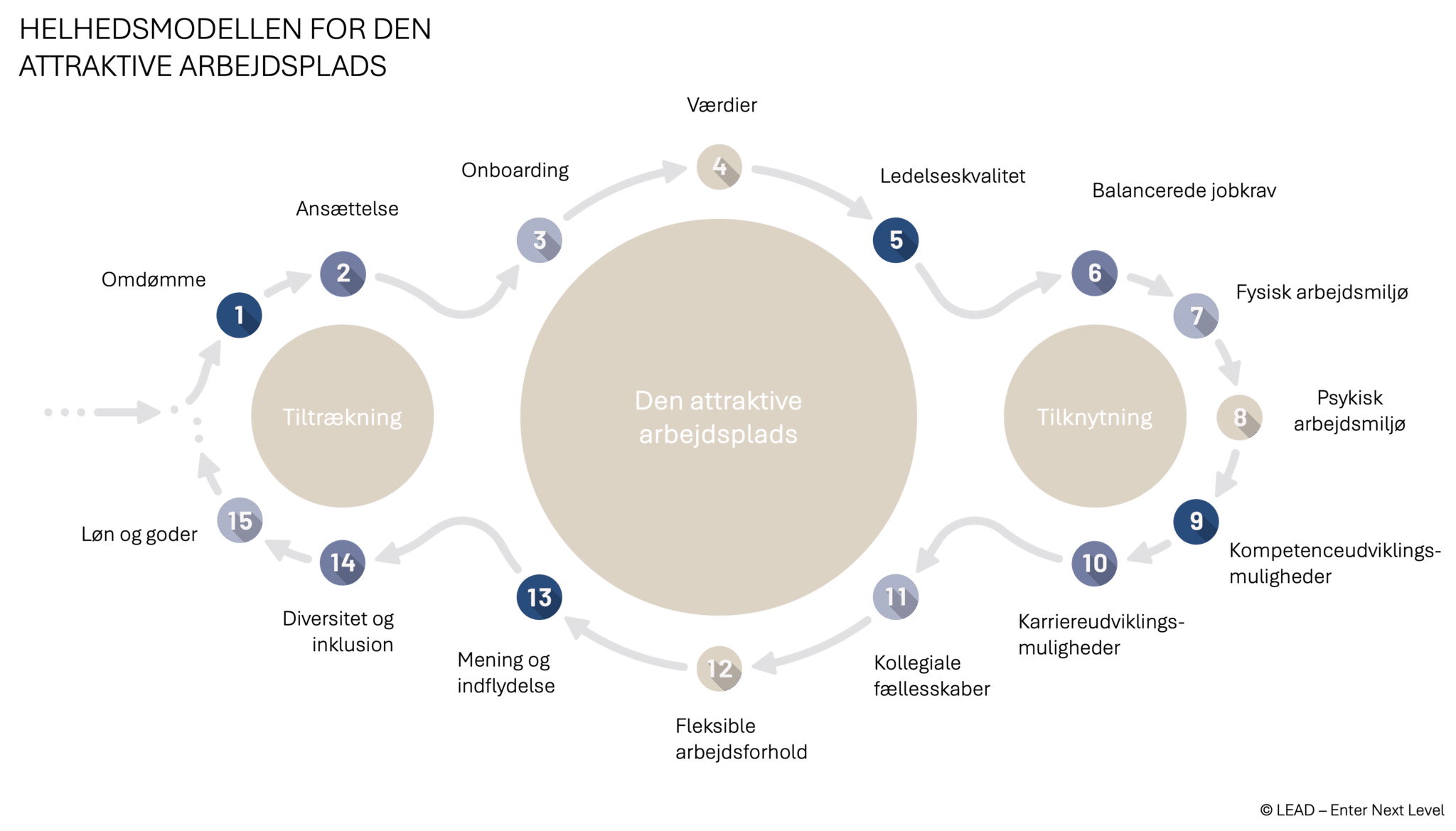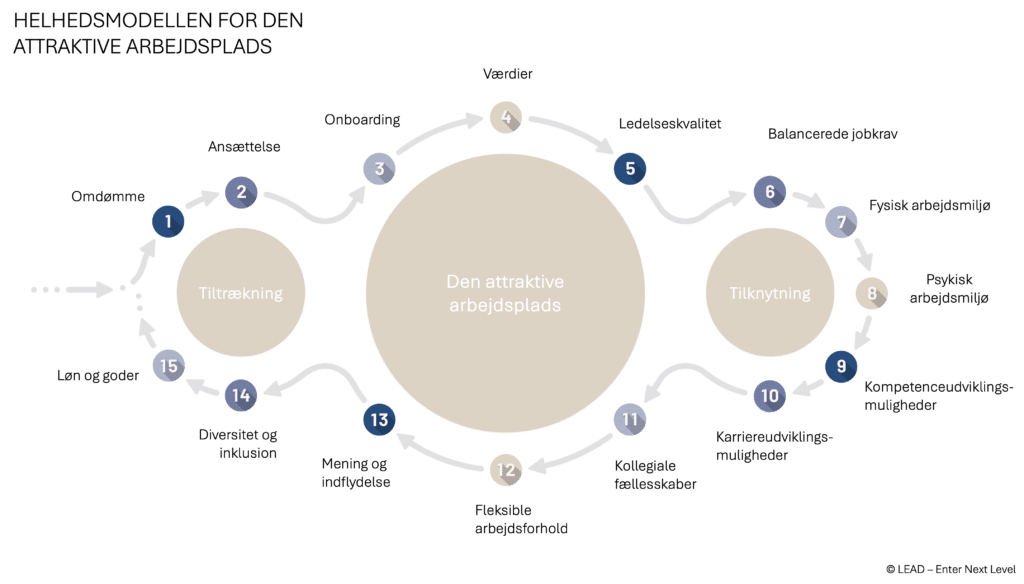By 2030, there will be a shortage of 90,000 people in the Danish labor market. Tackling this problem requires new ideas and perspectives. They start in language, with a rethinking of how the attractive workplace understands employee recruitment and retention.
For several years, there has been a desire in HR and management circles to replace "employee retention" with another term. After all, no employee wants to be retained, and no manager wants to hold their employees back against their will.
We experience it ourselves in LEAD when we give presentations about the attractive workplace. When we ask the question "what is the first thing you think of when you hear the word 'retention'?", we get answers like "restraints and straitjackets" (a psychiatrist), "non-compete and non-solicitation clauses" (a lawyer) and "leg lock" (a police officer). Retention is often associated with something negative. Therefore, there is a need to find a new term that evokes a more positive relationship between employee and workplace.
However, the need is due to more than the unfortunate images that 'retention' activates. By 2030, there will be a shortage of 90,000 people in the Danish labor market, and both the private and public sectors will be affected. So will citizens, i.e. the ordinary Dane, because the lack of employees will have consequences and it will become more difficult to deliver most things, even welfare services that today are seen as very basic.
So far, convincing solutions to this widespread problem are hard to find. One way to approach the problem that could lead to new ideas lies in language.
Concepts through concepts
People understand reality through concepts, so concepts must be used with care. Language shapes thoughts and actions. So changing language and concepts can affect how people think and act.
A natural place to start trying to tackle the labor challenge is therefore in language: If the starting point is different, the outcome is likely to be too.
Retention
Retention leads to a frame of mind where the organization or manager needs to hold back their employees - or keep them from moving on to other positions. It exudes reluctance and focuses on the needs of the organization. Furthermore, 'retention' reflects a dehumanized industrial society logic where employees are articulated as small cogs in the big organizational machine, or as resources the organization can exhaust.
With this logic, appraisals are conducted on the organization's terms and it is necessary as an employee and manager to pretend that the employee stays in the same workplace throughout their career. Development initiatives should therefore primarily or exclusively benefit the workplace and the employee's role in the current organization.
Affiliation
A shift from retention to attachment leads to interesting thoughts. Attachment is associated with emotional relationships and bonds and contains a latent notion that the manager's task is to promote the employee's desire to continue in the workplace. Attachment is rooted in a contemporary view of employees and people, where employees are not primarily bound to the organization through legal employment relationships and a financial transaction, but voluntarily connect to the organization on a deeper psychological and emotional level.
The retention manager
With this new concept comes new actions. The retention manager spends time drafting detailed employment contracts with legal bindings and clauses to hold on to the employee and make it as difficult as possible to move on. The retention manager conducts stay interviews and shows genuine curiosity to know how employees connect with the organization.
Leveled power relationship
Recruitment
To the same linguistic showdown that retention vs. attachment is part of, we add recruitment. It's a word associated with recruitment, selection and selection ('recruit' is the same word used to describe a conscripted private who is assessed as suitable). Recruitment brings to mind an employer-assessing 'do/doesn't' logic where the power lies with the hiring committee and the focus is on what the organization needs from the applicant.
This mindset is reflected in job advertisements that only tell you about the organization itself and the requirements they have for applicants. Communication during the application process is rare and inadequate, ending with a standard rejection to everyone without the opportunity to elaborate. Employers don't have to make an effort, and they have more important tasks to deal with than the applicants they rejected.
But the experience spreads and the organization's reputation suffers. Because who wants to apply for a job with an organization that only treats the people they need right now properly - and ignores the rest? However, the huge shortage of employees and the demographic trend of smaller generations entering the workforce is leveling out the power relationship between employer and applicant. This must be reflected in language and mindset. Otherwise, it will repel potential applicants.
Attraction
Instead of recruitment , we recommend thinking in terms of attraction. Because while the recruitment manager concentrates solely on what the organization needs, the attraction manager focuses on what the job offers applicants.
Ready for the future
Our linguistic changes are a break with a militaristic and dehumanized view of leadership, organization, employees and working life, rooted in older and widely criticized leadership theories and views of humanity.
Instead, we are ushering in a new pair of concepts that harmonize with modern ways of understanding management and work. And it's necessary, because while recruitment and retention are unfortunate words that stem from outdated thinking, the future-ready attractive workplace is built on attraction and connection. This is where the solution to the workforce challenge begins - with a linguistic shift that reflects a perception of reality that moves from human resource management to the mindset of human relations management .
Join us at our Attractive Workplace Conference
The Attractive Workplace conference is based on the holistic model. You will fill your toolbox with concrete tools for working strategically and purposefully to create and rethink an attractive workplace. And not least, you will be among the first to receive brand new knowledge, insights and a copy of the book "The attractive workplace - how to attract and connect employees" when it is published in December 2024.
The holistic model for the attractive workplace
The shift from recruitment and retention to attraction and connection is reflected in LEAD's holistic model for the attractive workplace.

Contact us to learn more about what we can do for your organization
Claus Elmholdt
Professional Director, Founder
Cand.Psych.Aut. & Ph.d.
Associate Professor in Management and Organizational Psychology, Aalborg University
Mobile: +45 26 14 51 57
Email: ce@lead.eu
Christian Nyvang Qvick
Partner in LEAD
Cand.scient.pol.
One of Denmark's leading consultants within visions, values and strategies in public organizations
Mobile: +2679 85 93 93
Email: cnq@lead.eu





